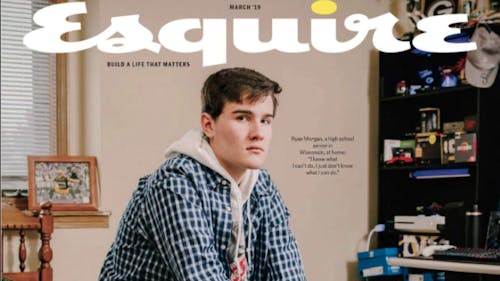Esquire starts media maelstrom around representation

Magazines, with their addiction to airbrushing and shock-value cover stories, have consistently sent people into a frenzy. From the 1991 Vanity Fair cover in which Demi Moore posed naked while pregnant to the 2012 Time Magazine cover of a mother breastfeeding her 3-year-old son, magazine covers have often been the subject of much debate and criticism. But that criticism constantly evolves.
Not too long ago, criticism ensued when media strayed too far from the picture-perfect “all-American” narrative. It’s quite a juxtaposition to our current situation, where that same old “all-American” narrative is demonized and media companies come under fire for not being inclusive enough.
The most recent magazine cover to come under fire is that of Esquire, after it decided that the story of a white, middle-class teenage boy would grace its cover. This story did to Twitter and progressives what Britney Spears's 1999 Rolling Stone cover did to conservatives.
People were angry for a variety of reasons. A demographic as hegemonic and privileged as “white male” is a story that doesn't necessarily need telling. This isn't saying that there shouldn't be a story written just because the subject is a white man, it's saying that a story that revolves entirely around being white and a man in America is unnecessary and unimportant.
The platform should be given to “real stories,” “real news” and people making a difference or overcoming great obstacles. Why is it being given to an average, white, middle-class teenage boy? Why is there a story being told about what it's like to be part of a demographic that has historically, and is currently, accepted and privileged? These are many sentiments felt by those bashing Esquire on its choice to tell Ryan Morgan’s story, the teenage boy on the cover.
A big reason Esquire is coming under so much fire for this story is because of the recent attention that has been brought to symbolic annihilation, which denotes that the absence of representation, or underrepresentation, is a means of maintaining social inequality.
To minorities and marginalized groups of people, not seeing themselves at all or seeing themselves portrayed inaccurately — have it be on the movie screen, in the news or in textbooks — is a threat to their futures.
Due to the importance that is stressed on telling stories that are inclusive, media outlets are being held highly responsible for representing marginalized groups of people in the stories they choose to tell. So it’s understandable why Esquire’s cover would have the reactions it received, but still, is the backlash too extreme?
Some people feel that Morgan is being attacked for just being a normal teenager, and to some extent, it’s true. You can’t blame Morgan for being a typical teenage white boy. In fact, if you were to interview most teenagers, regardless of their race or gender, many of their stories would be just as boring as Morgan's.
The difference is that the demographic Morgan is a part of is the most privileged in our society. To tell the story in a manner that verges on victimizing white men is unfair and wrong.
The problem lies not in the blandness and unimportance of the story, but in what stories like Morgan's on the cover of a magazine send to impressionable audiences. Christine Flowers, a columnist for the Delaware County Daily Times, said “the young white male is an endangered species struggling to survive in a changing habitat.”
While there are people who are upset about the cover story, there are many who feel that white men are in need of attention and understanding. “Esquire took pains to show how difficult it was for white boys to navigate the currents of race, gender, class and history without crashing against some politically divisive shore," Flowers said.
The cover fed into the idea that being white is now looked upon as “bad,” and that white men are becoming the minority that is not tolerated in the country. This idea is regressive and bolsters ideologies that support toxic beliefs of masculinity and race.
White people have never faced the oppression, institutionalization and dehumanization that minorities and marginalized people have.
The problem with the Esquire, or any media publication for that matter, is that they have the power to send messages that are misconstrued and damaging to people. Media is an integral part of society that has a direct impact on the lives and ideologies of people. It’s no surprise that it's being held at increasingly higher standards for the stories it chooses to tell.



